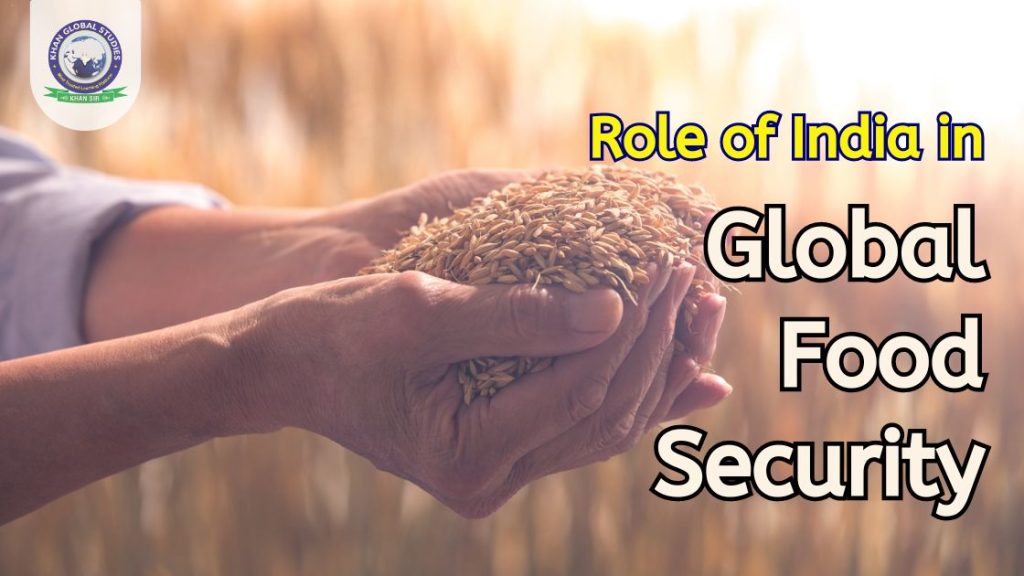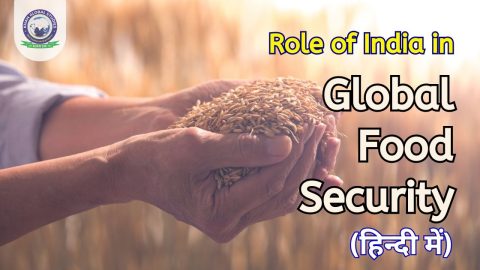Global Food Security, as defined by the United Nations, means ensuring that all people have adequate and nutritious food for a healthy life. India plays an important role in this field. This includes ensuring the production and continuous availability of sufficient high-quality, safe food. This requires effective agricultural support, transportation, distribution systems and resource sustainability. Sustainable practices are necessary to protect the environment.
Global food security is a complex issue, encompassing the entire food cycle from seed to consumption. It faces challenges such as climate change, domestic inflation, water scarcity, land degradation and political and economic instability.
Organizations, governments and societies are working to maintain and enhance food security in line with the UN Sustainable Development Goal, to end hunger, achieve food security, improve nutrition and achieve sustainable development by 2030. Till sustainable development can be achieved. A sustainable food production system can be ensured. India’s significant contribution to agriculture is important in helping achieve global food security.
Furthermore, World Food Day, celebrated every year on 16 October, aims to raise awareness about global hunger and promote efforts to ensure food security for all. The day emphasizes the need for sustainable agriculture and equal access to nutritious food. It provides a forum for governments, organizations and individuals to address issues related to food production, distribution and consumption and find solutions. The overarching goal is to eliminate hunger and malnutrition around the world. World Food Day reminds us of our collective responsibility to work towards a world where everyone has access to adequate, safe and nutritious food.
India’s Role in Global Food Security
India is important for its position in food security across the world. It not only contributes a significant amount of nutrition to the world but also helps in sharing research about sustainable efforts made to tackle challenges like climate change. Some relevant references to India’s role in global food security are:
Agricultural Production
Being one of the largest producers of agricultural commodities, India’s climatic zones help in cultivating the land for a wide variety of crops. From rice to vegetables, wheat to dairy products, India increases the availability of food globally.
India has significantly expanded its food production, with food grain production increasing sixfold from 50 million tonnes in 1950–51 to about 300 million tonnes in 2019–20. This growth has helped transform India from a food-deficient country to a self-reliant food-producing country.
Cost-Effective Strategies in Research and Development
India is one of the countries which invests in agricultural research and development. It experiments and develops methods to ensure a high-yield crop supply. It also works on cost-effective strategies in farming.
Food Export
India has diversified its food production and has become the largest producer of milk, pulses, horticulture and livestock in the world, as well as the top exporter of prawns and spices globally. It has contributed not only to India’s economy but also to global food security by providing a stable supply of food products.
Buffer Stock Management
Granaries are used strategically for storing food in the country. This ensures that food remains available during shortages or price fluctuations. Additionally, it helps stabilize food prices around the world and gives India the option to release stocks whenever necessary to prevent shortage problems.
In India, a combination of laissez-faire and Food-Security-Focused Stock Management reduces the country’s dependence on expensive grain imports and helps maintain stable food prices. This approach has been effective in ensuring food security within the country and can serve as a model for other nations.
A frequent participant in international forums on food security, India also engages in dialogue with the Food and Agriculture Organization and the World Food Program to improve global food security and engage in sustainable agricultural practices. Through these platforms, India ensures that it shares knowledge in the field of productivity in the agriculture and food sectors. These knowledge systems help create structures that last.
Challenges for global food security in India
India faces several challenges to global food security:
- Population Growth: The increasing population in India has increased the demand for food. Grain exports such as wheat and rice have been banned to ensure adequate domestic food supply.
- Climate impact: Global warming has adversely affected land and biodiversity important for food production. This has led to changes in pests, diseases and crop-damaging disasters.
- Economic Shocks: Economic shocks have disrupted food supply and demand, prompting people to sell low-quality, expensive essential goods. According to the EU Science Hub report, it is the leading cause of acute food insecurity in 22 countries, affecting 153.3 million people in 2023.
- Unemployment: The economic crisis led to the loss of jobs in the agricultural sector and the weakening of essential health and social services.
- Distribution Challenges: Natural and man-made disasters can disrupt food distribution. Landslides and limited access to remote areas cause shortages, while wars drive up prices and hinder crop growth.
These challenges, which are faced not only by India but many other countries, are an integral part of global food security. Despite the complexities, India is making efforts to address them, demonstrating its commitment to crisis management.
Government initiatives to ensure Food Security
The Government of India has taken steps in the right direction and has taken the necessary steps to ensure food security. Several initiatives are being taken like the National Food Security Act, 2013 and National Innovations on Climate Resilient Agriculture (NICRA) in 2011 to ensure utmost care and nutrition for its people.
Some of these initiatives are:
Eat Right India Movement
The Food Standards and Safety Act took the lead in changing the food system in India. The Eat Right Movement ensures safe, healthy and sustainable food for all with its tagline ‘Right Food, Better Life’. It adopts a “judicious blend of regulatory, capacity building, collaborative and empowerment approaches” to ensure it is sustainable for the planet. Suitable for people.
The Eat Right Awards have been established to recognize the contribution of the food industry in empowering citizens to make safe and healthy choices. FSSAI also encourages people to participate in the Eat Right Mela which is an outreach activity to remind all citizens to eat right.
Nutrition Campaign
The Poshan Abhiyaan, launched on March 8, 2018, seeks to enhance the nutritional well-being of adolescent girls, pregnant women and lactating mothers within a specified time frame. This must be accomplished through a coordinated and result-focused strategy. Its primary focus is to reduce the stunting rate from 38.4% to 25% by 2022.
Food Fortification
To address the issues of malnutrition and nutrient deficiencies, FSSAI recommends food fortification. It has been declared a scientifically proven and cost-effective way of ensuring that all vital nutrients are present in every food item. In 2016, the Food Safety and Standards (Fortification of Foods) Regulations were implemented to reduce micronutrient malnutrition in India.
National Food Security Act
In 2013, the Indian Parliament enacted the National Food Security Act intending to guarantee food and nutritional security at different stages of human life. The primary goal is to ensure that individuals have affordable access to high-quality food in sufficient quantities to enable them to maintain dignified lives. The law provides subsidized food grains through a targeted public distribution system and ensures that every household receives adequate nutritional value.
These are some of the many initiatives taken by the government to ensure food security. Moreover, with the rise of innovations in agricultural sectors in India, we are bound to create easier and more cost-effective methods soon.
India’s role in helping other countries during the crisis
India is helping Afghanistan’s people with humanitarian food assistance through the United Nations World Food Program (UN WFP). As per his commitment, he is sending around 50,000 metric tonnes of wheat through Pakistan to Afghanistan to help it deal with its crisis.
Over the past few years, India has also assisted many other countries in Africa and the Middle East during natural disasters and the COVID-19 Pandemic, which has brought devastation to many people.
India has expanded food production and created adequate security reserves of food grains. India is now a net food exporter and ranks ninth in terms of being the largest exporter of agricultural products in the world.
With this unprecedented increase in profits, India has transformed in just 30 years from a nutrient-deficient country to a self-reliant country capable of exporting surplus products, which is an inspiration for many developing countries.





